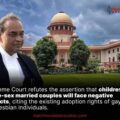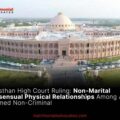
The constitutional morality and social morality in the “matter of marriage institution” are required to be balanced, the Court said while sending a Muslim man’s Hindu live-in partner to her parents.
In a recent ruling, the Allahabad High Court stated that individuals practicing the Islamic faith are not allowed to claim the right to live together, especially if they are already married. The decision, delivered by a division bench consisting of Justice Attau Rahman Masoodi and Justice Ajai Kumar Srivastava, was based on the reasoning that governs marital behavior, encompassing both legal statutes and individualized legal principles. This legal interpretation highlights the importance of considering existing customs alongside formal legal frameworks, promoting fairness in the treatment of various legal perspectives.
“The customs and usages are an equal source of law recognized by the Constitution as the law made by the competent Legislature. Once there is a recognition of the customs and usages as a valid law within the framework of our Constitution, even such laws become enforceable in an appropriate case,” the Court said.
Moreover, it stressed that the constitutional protection outlined in Article 21 does not automatically support the right to engage in a live-in relationship, especially when established traditions and customs expressly prohibit such partnerships between individuals.
“A person reposing faith in Islam cannot claim any rights in the nature of a live-in-relationship, particularly when he has a living spouse,” the Court said.
During a hearing addressing a petition seeking to dismiss a kidnapping charge against an individual and prevent interference in the relationship of a Hindu-Muslim couple, the Court made significant observations. However, it noted that the couple had previously filed a petition seeking protection of their freedom. Upon examining the records, the Court found that the Muslim man was already married to a Muslim woman, with whom he had a five-year-old daughter. Additionally, it was brought to the Court’s attention that the Muslim man’s wife had consented to his live-in arrangement due to her health issues.
In the latest petition, it emerged that the man had issued a triple talaq to his wife. On April 29, the Court instructed the Police to produce the Muslim man’s wife and requested his presence alongside his live-in partner. The following day, the Court received troubling revelations. It was disclosed that contrary to the man’s assertion, his wife was not residing in Uttar Pradesh but rather in Mumbai with her relatives. The Court observed that the petition aimed at quashing the kidnapping case essentially sought validation of the live-in relationship between the Hindu woman and the Muslim man.
“This relief is sought in a situation where petitioner No.2 belonging to a different religion is already married and has a minor child of five years of age. The religious tenets to which the petitioner No.2 belongs to, does not permit live-in-relationship during the subsisting marriage.”
The Court suggested that the scenario could differ if the two individuals are unmarried and, being of legal age, choose to live their lives based on their personal preferences.
“The constitutional morality in that situation may come to the rescue of such a couple and the social morality settled through the customs and usages over ages may give way to the constitutional morality and protection under Article 21 of the Constitution of India may step in to protect the cause”.
As a result, the Court directed the police to accompany the man’s live-in partner to her parents’ home and provide a detailed report on the situation.
“The Court shall next go into the question of concealment of material facts and we find that the counsel appearing in the two cases has risked at his own cost to abuse the process of law,” the Bench said while listing the matter for further hearing on May 8.





